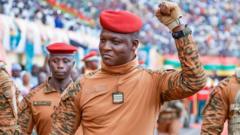Burkina Faso's young military leader, Capt Ibrahim Traoré, has captured international attention with his revolutionary rhetoric and strategic pivot away from Western alliances towards nations like Russia. His popularity reflects a growing disillusionment with traditional Western-aligned governance in Africa, making him a figure of Pan-African hope despite concerns over his regime's authoritarian tendencies.
Burkina Faso's Junta Leader Ibrahim Traoré: A Pan-African Symbol of Resistance

Burkina Faso's Junta Leader Ibrahim Traoré: A Pan-African Symbol of Resistance
Capt Ibrahim Traoré has rapidly garnered a following by promoting anti-colonial sentiment and forming alliances that challenge Western influence in Africa.
Burkina Faso's Captain Ibrahim Traoré, a charismatic 37-year-old military leader, has swiftly emerged as a symbol of Pan-Africanism, appealing to many who share a desire for liberation from what he perceives as Western imperialism and neo-colonialism. Traoré's governance, marked by a significant shift away from traditional colonial ties—specifically those with France—toward a new partnership with Russia, has led to widespread admiration not just in Burkina Faso, but across the African continent and beyond. His motivations and policies echo those of celebrated African leaders such as Thomas Sankara, a revolutionary figure in Burkina Faso's history known for his anti-imperialist stance.
Since he took power in a coup in 2022, Traoré's administration has implemented left-leaning economic strategies, including the creation of state-owned enterprises in the mining sector. This approach has garnered support from local populations who are seeking more equitable distribution of the nation's mineral wealth. The ruling junta has mandated that international mining companies share their operations with Burkinabé entities and invest in local communities.
Africa's contemporary political landscape shows increasing discontent with Western-style governance. Research indicates a decline in support for democratic systems across African nations as leaders like Traoré, who are perceived as champions of a more assertive, independent political philosophy, gain traction. His invigorated popularity is partially attributed to his effective use of social media and engaging public appearances, particularly following impactful speeches at forums emphasizing African autonomy.
Despite his rise to prominence, Traoré's leadership is not without controversy. Critics, including international leaders, have decried his alliance with Russia and highlighted his regime's suppression of dissent within Burkina Faso. Nonetheless, his ability to galvanize support puts him in a unique position in a continent where young populations are increasingly disillusioned with traditional governance structures that often fail to deliver on promises of economic improvement and stability.
Supporters regard Traoré as a refreshingly dynamic leader in a region that longs for authentic representation. His image is further amplified by global social media, where figures from various sectors, including music and entertainment, reference his leadership style positively, enhancing his appeal to youth audiences domestically and among the African diaspora.
However, challenges persist. Traoré has struggled to address a decade-long Islamist insurgency that threatens national security despite his promises of a transformative agenda for peace and stability. Additionally, the junta's crackdowns on political freedom and expression raise concerns among human rights advocates.
Experts suggest that while Traoré has successfully captured the sentiments of an increasingly youthful electorate disenchanted with the status quo, his approach will need to prioritize inclusivity, governance reform, and institutional development. These elements are crucial for ensuring that his legacy extends well beyond mere populist appeal and towards sustainable progress for Burkina Faso.
As Traoré continues to weather the complexities of governance, his leadership will undoubtedly shape the trajectory of not just Burkina Faso, but potentially the broader West African region as more nations assess their own ties with former colonial powers in the wake of rising global multipolarity.



















